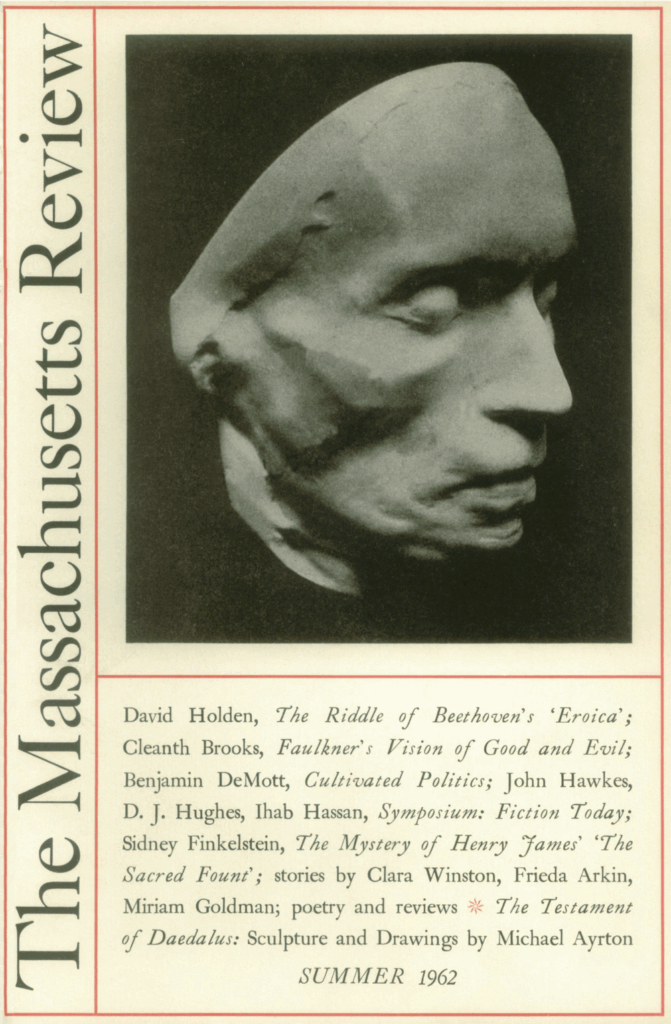Volume 3, Issue 4

FRONT COVER: Josef Danhauser
BEETHOVEN: DEATH MASK, 1827
Table of Contents
The Riddle of Beethoven’s “Eroica,” Non-Fiction by David Holden
My Father’s Silence, Poetry by John Holmes
Piano Music, Poetry by Jack Anderson
Noah’s Wife, Poetry by Jayne Berland
A Lovely Day, Fiction by Clara Winston
Night Song; The Victim; Tristram; Song of the Mad Bomber of Hiroshima; Notes for Charles Burchfield: Painter, Poetry by Neil Myers
Celebration, Poetry by Paul Ramsey
Prey, Fiction by Miriam Goldman
The Seal Cannot Be Read, Poetry by Eve Triem
House on the Point, Poetry by Paul Petrie
Playing under the Apple Tree; This River that is East of Eden, Poetry by S. C. Leland
Faulkner’s Vision of Good and Evil, Non-Fiction by Cleanth Brooks
The Indian Cranes; A Child’s Version of Spring, Poetry by Philip Murray
Dive, Poetry by Milton Speiser
A Ride In, Fiction by Frieda Arkin
The Children, Poetry by Robert Burlingame
The Testament of Daedalus, three excerpts from a poem and eight reproductions of sculpture and drawings, by Michael Ayrton; with a note by L. B.
The “Mystery” of Henry James’s “The Sacred Fount”, Non-Fiction by Sidney Finkelstein
Cultivated Politics, Non-Fiction by Benjamin DeMott
SYMPOSIUM: FICTION TODAY:
Notes on the Wild Goose Chase Non-Fiction by John Hawkes
Character in Contemporary Fiction, Non-Fiction by D.J. Hughes
The Existential Novel, Non-Fiction by Ihab Hassan
In Memory of Daniel Halévy: 1872-1962, Non-Fiction by Mina Curtiss
IN REVIEW:
Spiritual Arrogance and Impassioned Humility, Non-Fiction by Thomas Whitaker
That Which Is Called Décor, Non-Fiction by Harold Clurman
A Beautiful Autopsy, Non-Fiction by Alan MacGee
James’s Case: the New York Edition, Non-Fiction by Priscilla Gibson
Contributors
John Holmes‘s work in the cause of poetry throughout his distinguished career as poet, teacher and critic is immeasurable; he died on June 22, 1962 in Medford, Massachusetts, at the age of fifty-eight. In a letter to the editors on April 16, commenting on his poem, “My Father’s Silence,” printed in this issue of MR, he wrote: “This long poem I’m showing you is pretty straight autobiographical, and in fact Berkshire regional. My father did have these black moods in his later life, and I thought I’d escaped them but as I get nearer the age he was, I realize one does not. But there is the difference, just enough, so that I think maybe by plunging into the black mood and coming back and telling my truth, I have found out something.”
Jack Anderson has published verse in little magazines; he is assistant drama critic of the Oakland Tribune and a correspondent for Ballet Today.
Frieda Arkin, who taught anthropology at Hunter College for seven years, now concentrates on writing short stories; one of her stories will be reprinted in Best American Stories next year.
Michael Ayrton, English sculptor and painter, writes “from time to time when words seem to clarify visual images”; The Testament of Daedalus, his first attempt at verse, will be published with twenty-six of his drawings later in the year by Methuen in London.
Jayne Berland of Manhattan, Kansas, is working on a novel.
Cleanth Brooks is Gray Professor of Rhetoric at Yale; his next book will be a study of the work of William Faulkner.
Robert Burlingame will have a poem reprinted in the Borestone Mountain Poetry Anthology for 1961.
Harold Clurman, drama critic for The Nation, is the author of The Fervent Years, an account of his experience as a founder and director of the Group Theatre.
Mina Curtiss, who for many years taught English at Smith College, edited the Letters of Marcel Proust (1949) and is the author of Bizet and His World (1959) ; she is now translating Daniel Halévy’s Degas parle and is writing a book about Manet and his circle.
Benjamin DeMott, Professor of English at Amherst College, is the author of a novel, The Body’s Cage (1959), and of a forthcoming book of essays, Hells & Benefits (Basic Books, 1962).
Sidney Finkelstein is the author of Arts and Society (1947), Realism in Art (1956) and Composer and Nation (1960).
Priscilla Gibson has taught at Mount Holyoke College and is the author of a dissertation on the New York Edition of Henry James’s work.
Miriam Goldman appears here with her third contribution to MR.
Ihab Hassan, Professor of English at Wesleyan University, is the author of Radical Innocence (1961) and other essays on contemporary literature.
John Hawkes has written four novels, including The Cannibal and The Lime Twig; he has been awarded a Guggenheim Fellowship in fiction for 1962-1963, and a National Institute of Arts and Letters grant.
David Holden is a composer, music critic, and teacher at Mount Holyoke College.
D. J. Hughes is a poet and critic who teaches modern literature at Brown University.
S. C. Leland, who graduated from Amherst College in 1959, has his first published poems in this issue.
Alan McGee considers himself “really a medievalist,” although he teaches a variety of courses at Mount Holyoke College.
Philip Murray lives in New York City; his first book of poems is in preparation.
Neil Myers teaches English at Purdue University.
Paul Petrie teaches at Brown University.
Paul Ramsey has published numerous poems and articles, including a recent study in poetic theory, The Lively and the Just (University of Alabama Press, 1962).
Milton Speiser, a Senior Employment Manager for the New York State Department of Labor, has published verse in New Directions 16, The Nation and The Antioch Review.
Eve Triem, a winner of the annual prize of The League to Support Poetry, last year made a recording for the Library of Congress.
Thomas Whitaker teaches English at Oberlin College.
Clara Winston, novelist and translator, is the author of The Closest Kin There Is and The Hours Together.


